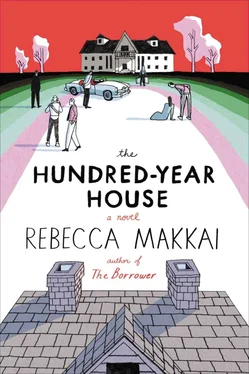George was saying, “The man eats coins. Did you know that? I saw him put a nickel in his mouth, when he thought I wasn’t looking.”
“Oh. Who?”
“Max. The driver. I said.”
“That can’t be true. Did he swallow it?”
“No idea.”
She managed to get a bite in. George was waving to the third man, who’d just entered.
Grace dropped her napkin on the floor and ran to the bathroom, and the vomit barely made it in the toilet. Look at the tiles on the floor. Look: a graph-paper grid. Her own, private, tessellated map to her appointment in Samarkand.
Why should she be so surprised by it all? By getting exactly what she’d signed on for, no more and no less? Except that we become so used to the twists of chance and fortune. Sometimes the greatest shock is getting exactly what we’ve been promised.
Back at the table, George and the men were laughing. One scooted over and patted the bench next to him. But she stayed standing and said, “George, I’m ill. I’ll call Max to bring me home in the Capri.”
George nodded. “Sure, Duck.”
She called the coach house line from the pay phone by the bar. It rang and rang and rang, and no one picked up. It was six thirty now, and they’d left the house at five. Soon Amy would give up on her for dinner, and Max would be finished with Sid Cole. She sat back at the table. The men talked about soccer. She couldn’t imagine why.
She might have slept a bit, but now she felt worse. She tried the coach house again, and the main line too, and no one picked up. She came back and waited for a pause and said, “George, why don’t I drive the Darrin home and tell Max to pick you up in the Capri?”
“We’ll be done soon,” he said to her. But she could tell that they wouldn’t, and that it would not be wise to press the issue. He wouldn’t let her drive the Darrin even under the best circumstances, and he’d never hand over the keys in front of these men. He was quite drunk now. There was another full scotch in front of him. She made her hands into a pillow on the placemat.
Finally they finished. There were papers on the table, and George took some of them, and one of the men took the rest. George said, “Okay, Duck, let’s go.” But when he stood, he caught his ankle on the table and nearly pulled the whole thing over with him. He righted the table but fell himself, and Grace propped him up by the elbow.
“He okay?” one of the men said, and another of them laughed.
“We’re calling someone to drive,” Grace told them, and George didn’t object. She led him to the pay phone and used the same dime, the same unlucky dime, to call the coach house. It was now nine o’clock, and either Amy or Max had to be home. The men, seeing she had the receiver to her ear, nodded and left the restaurant. George leaned against the wall.
The phone rang and rang and rang. Max should be home — Sid never stayed this late — but then he might be down in the garage. It might take him a while to hear the phone and get upstairs to the kitchen. And where was Amy? George grabbed her arm. “This is ridiculous. Let’s go.”
She didn’t hang up. “I’ll drive,” she said. “Or we’ll call a taxi.” She shouldn’t have raised the issue earlier — he might have remained malleable. Now he’d never give in.
“Grace, let’s go.” His voice was louder than last time, and the bartender glanced in their direction. Next time would be louder, she knew, and all these people would look up from their spaghetti in dismay.
She listened for one more ring, and one more ring, and one more ring. The rings lined themselves up like bathroom tiles. One more, one more, one more. George took the phone and hung it in its cradle.
Outside, Grace tried to catch the valet’s eye, hoping he’d figure out everything wrong, call the police or a cab, but he just sent a boy out to bring the car, and the boy opened Grace’s door for her, then struggled to slide it back. Everyone stared at the car, the strange and shiny car, and no one noticed the problem. George took off like they were being chased.
Down Sheridan Road, down the middle of it, really, with a sharp jerk to the right whenever another pair of headlights appeared. Grace hadn’t been out at night since all the leaves had fallen, and she realized with wonder that for the first time since they’d moved here in the spring, she could see the houses — see into them, even, as George tried to light a cigarette and compensated by suddenly driving too slowly. Those homes always seemed so hidden and empty, no life but for someone out on the sidewalk. Now, every illuminated room was a perfect frame of yellow. Each frame both a revelation and a further mystery. She’d forgotten that November was such a strange, unveiling time of year — not a deadening but a quickening. In the smaller houses, closer to the road, she could make out a clock, a shelf of plants, an old woman, a refrigerator. In the bigger ones, behind stone walls, just an occasional upstairs hall light. She wanted to climb into each frame, to live in each for a year. But then George picked up speed again.
She might say something about it, might see if George understood even a little bit. And if he did, she might tell him, tomorrow, about the baby too. The baby might change him. Perhaps change was possible even while staying put, staying with him, staying in the house.
They turned, and the right-side wheels went up on the curb and down with a horrible jolt. Her nausea returned, from the floor of her stomach upward in a wave, and she grabbed the door handle. She was too dizzy, too tired, to work up the appropriate anger at herself for getting into this situation, when she might have wrested the key from him or passed a note of distress to the bartender. Surely there was something she might have done. Wasn’t there always something to be done?
They turned again, and now he was going so fast that the lights in the houses were just blurs. She knew that if she asked him to slow down, he’d only speed up.
There was Laurelfield, dark and still, the gate open. George took the entry wide and fast and nearly clipped the gate. He turned toward the coach house without slowing. The gravel hitting up again, a thousand little bullets. “Look at that,” George said, meaning she should look up before they went through the open garage door, look at the bright windows of the coach house kitchen and Max’s rooms. “He’s home after all. The bastard is home.”
And she would have looked, she would have looked, but the gravel was still hitting too fast. The trees were coming too fast.

Zilla was a moving statue in the torchlight. If Eddie could, he would love her: her hair a black puddle, her teeth a broken necklace. Her white throat, thrust forward when she laughed. Viktor, though — Viktor Osin did love her, or else what was this filament between them, across the night?
There were only the eight: Samantha had stayed back.
Marlon Moore led them all to the teepees, which were just as he’d described: cloth cones in the field, big enough for all to squeeze inside just one. They passed the flask again. Vital to maintain the drunken state in which the plan was hatched, lest they sober up and discover themselves ridiculous. It was only a few drinks into the evening that Marlon had volunteered his story — dragged by a colleague’s wife to last year’s Chippeway Ball — and several drinks later that the joke had started: A true Chippeway Ball should feature more scalping and war whoops and nudity. The sun had set, additional bottles brought to the terrace, when it became a plan, when Viktor and Marlon and Eddie drove to the college where Marlon taught, and broke into the theater’s costume shop and returned with headdresses and face paint.
Читать дальше













